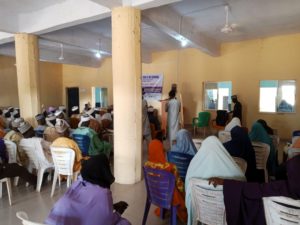In July 2021, the Keeping girls in school network led by the Emir of Argungu organized a town hall meeting in the Argungu community, Kebbi state, Nigeria. To have a data-informed conversation and subsequent solutions. Hence, an academic paper on the situation of girls’ education in Kebbi state was presented by Mallam Abdulsalami (KGIS Youth Group Lead) to draw the attention of the gathering on the issue that is troubling the community, which cannot be solved without allowing the girls’ child to fully attend at least secondary school. This sub setting issues include maternal and infant health and family income which is important for address poverty.

Among the major issues raised by parents and stakeholders during the meeting include:
- A called on the government to come up with a Law that will penalize those who remove their daughters from school before the completion of secondary education.
- The need for parents, traditional rulers and the government to join hands on keeping girls in school.
- Assisting girls in the community to complete at least secondary school but their parents/guardians cannot afford to sponsor them.
- The challenges in girls’ education are as a result of neglect of the traditional institutions by the government.
- A plea to the government to improve the welfare of girls in school to encourage parents to send their daughters to school.
The religious leaders as one of the core components of the KGIS initiative as such the chief Imam of Jibwis in Argungu reminded the congregation of a story of the companion of the Holy Prophet Muhammad about their concern on the Girls child education more especially as it relates to health; he said “females are the ones that are taking care of those who were injured during the war” therefore, the need for empowering the girls child with requisite skills in this era cannot be overemphasized.
As the chief host, the Emir of Argungu, called on the entire people of Argungu emirate to cooperate with the KGIS network for the success of ensuring girls school enrolment, retention and completion of at least secondary education.
